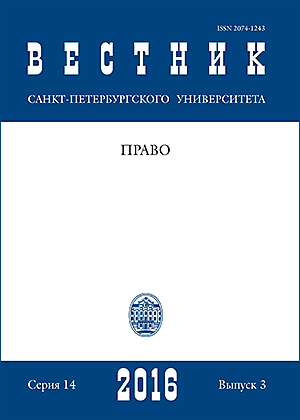Admissibility of deprivation of nationality and extradition of a person with multiple nationalities who has comitted a crime
DOI:
https://doi.org/10.21638/11701/spbu14.2016.302Abstract
Improvement of methods of fighting against transnational crime demands the analysis of possible legal consequences which the state has the right to use the whilst observing obligations in the sphere of protection of human rights. This article takes into account regularities in the development of the legal regulation of multiple nationality (citizenship), the disclosure of its essence, the question of the admissibility of deprivation of nationality and an extradition of a ‘polipatrid’, i.e. the person having the nationality of two or more states. Historical, legal and teleologic interpretations of norms of the Constitution of the Russian Federation allows the author to draw the conclusion that these norms which were accepted for restriction of opportunities of the state on a rupture of legal communication with the citizen completely exclude possibility of the introduction of the institute of deprivation of Russian nationality. However they do not deter the introduction to the legislation (or in the international treaty) rules about the extradition of such a person. The conditions of such a transfer can be the consent (petition) of the person with regard to it and determining the country of continuous residence. Refs 19.
Keywords:
multiple nationality, deprivation of nationality, extradition, transnational crime
Downloads
References
Downloads
Published
How to Cite
Issue
Section
License
Articles of "Vestnik of Saint Petersburg University. Law" are open access distributed under the terms of the License Agreement with Saint Petersburg State University, which permits to the authors unrestricted distribution and self-archiving free of charge.






